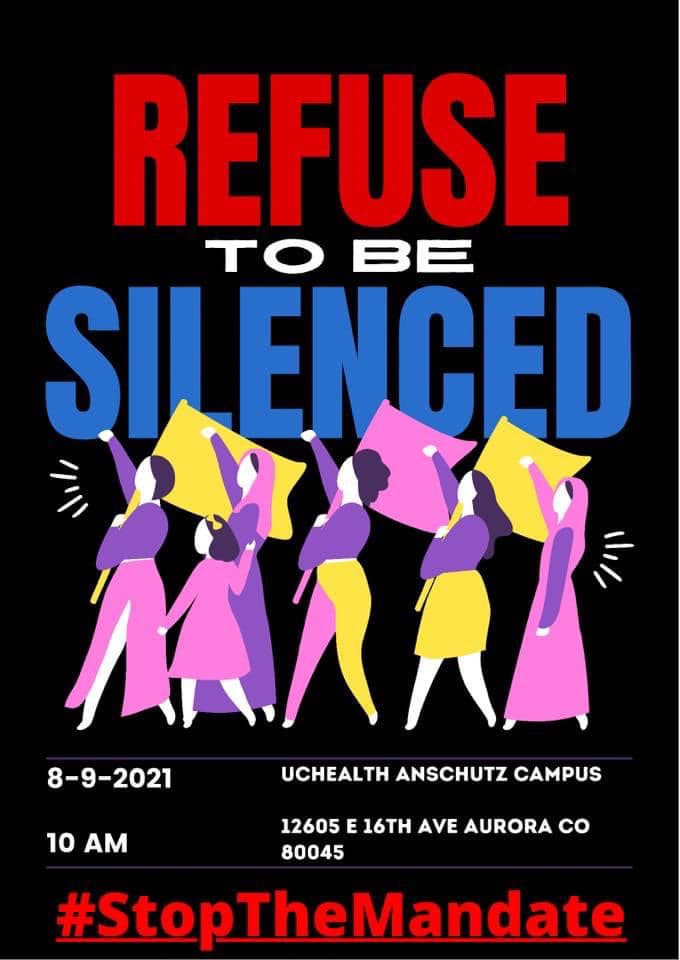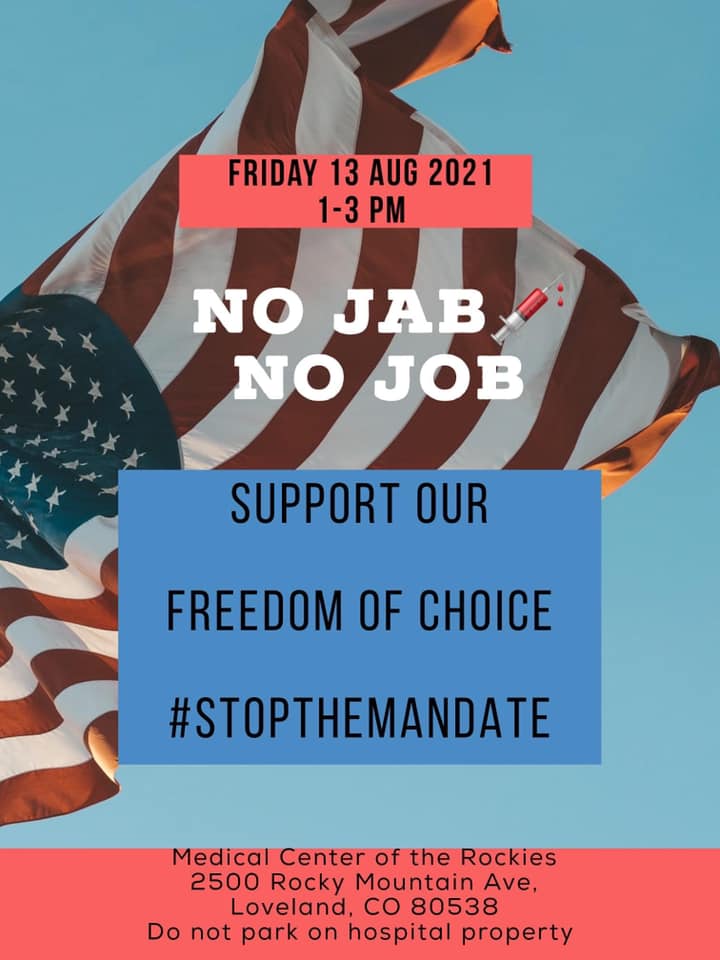DENVER — Nurses and other front-line healthcare workers upset over threats of job loss if they don’t get the COVID-19 vaccination are taking to the streets and asking for support from others to push back against the mandates, which organizers say goes against everything they ever learned in nursing school.
Two events for Colorado are currently on the calendar with more to come, those close to the effort say. Monday, health care workers and their friends and families will gather at 10 a.m. outside Anschutz Medical Center in Aurora. Another protest is scheduled for Aug. 13. From 1-3 p.m. outside Medical Center of the Rockies in Loveland.
 “No Jab, No Job,” and “Refuse to be Silenced” as the rallies have been named, hope to bring awareness to what protest organizers say is hypocrisy at its best.
“No Jab, No Job,” and “Refuse to be Silenced” as the rallies have been named, hope to bring awareness to what protest organizers say is hypocrisy at its best.
Kinley Queen-Thompson, along with Stephanie Thorpe, are scheduling events across Colorado at major hospitals as part of a larger effort of healthcare workers protesting the vaccine requirements nationwide.
For example, on Aug. 2, in New York, just hours before University of Rochester Medical Center and Rochester Regional Health announced vaccination mandates, more than 100 health care workers gathered outside Strong Memorial Hospital to protest the new requirements.
That same day hundreds of miles away, healthcare workers in both North and South Carolina were doing the same thing outside Atrium Health. Before them, workers protested outside Duke University Hospital and many others as the push-back against mandatory vaccines is reaching new levels among those who have been on the front line of the pandemic since its beginning.
A ‘taboo topic’
“This is such a taboo topic in healthcare that nobody openly talks about due to shame, ridicule and retaliation,” Thorpe said. “My original goal was to hopefully encourage other healthcare workers to see that they are not alone in the way they were feeling and that it is okay.”
Around the same time, Queen-Thompson was having the same idea. The two women met and decided to merge and join efforts.
“When I seen the mandates happening, I was compelled to stand up and be that voice for my fellow nurses and healthcare workers,” Queen-Thompson said. “Partnering with Stephanie has been a godsend and I am so grateful to have found like minded people.”
Thorpe has been a registered nurse for more than decade and is currently at UCHealth. Queen-Thompson began her career in health care at 16 as a certified nursing assistant, eventually becoming a licensed practical nurse, and prior to COVID, was on track to receive her bachelor’s degree as a registered nurse. She currently works for a long-term care facility.
Organizing online
“We received the mandate from UCHealth last week, and I just knew there had to be more people who disagreed or were not ready to get vaccinated quite yet, considering how new all of this is,” Thorpe said. “So, I jumped into action and started a Facebook group in hopes to find some like-minded nurses. Somehow Kinley and I met and found out we both had started our own groups and joined forces.”
 The Facebook group the two women moderate, “Nurses and Healthcare Workers United,” has more than 1,200 members in the first week since they started the group, which they call, “a safe place for nurses and healthcare workers to have support, collaborate, and have their voices heard.”
The Facebook group the two women moderate, “Nurses and Healthcare Workers United,” has more than 1,200 members in the first week since they started the group, which they call, “a safe place for nurses and healthcare workers to have support, collaborate, and have their voices heard.”
Elizabeth Maxey, a Greeley RN, who has moderated her own private group pushing back against mask and vaccine mandates since the state first responded to the virus in March of 2020 with lockdowns, is also a part of that group and supports this effort fully. She plans to be at the rallies and encourages others to do the same.
‘Nurses are patients too’
“One of the things we learned most in nursing school was to be an advocate for our patients and medical autonomy,” Maxey said. “Nurses are patients too. We have a right to decide what we want to put in our bodies, and my ability to provide excellent medical care has nothing to do with having a vaccine.”
Maxey said most frustrating is for 18 months, she worked on the front line without a vaccine for UCHealth as an advanced care partner, which was the role they gave nursing students during the COVID breakouts.
“It’s absolutely ludicrous,” Maxey said. “There were days where 75 percent or more of my patients had COVID, and I was in and out of these rooms flipping between a respirator and a regular mask, and some patients we were waiting on results, so we were going into those rooms not necessarily with all the (personal protective equipment). Even when I was doing my practicum I was exposed over and over again without a vaccine.”
Maxey said she eventually contracted the virus herself and believes those antibodies are good enough. Maxey is now about to start an RN position with a private healthcare facility that allows its staff to choose whether to become vaccinated.
“I think we are at a defining point in medical history,” Maxey said. “With these mandates, it is important for nurses to stand up. We are on the brink of not having the ability to say what we can do to our own body. If they can mandate this now, then what about the next time. This sets a precedent.
“I never thought I’d be the nurse advocating for myself and every other healthcare worker out there. If you are in the medical community, you know it is still the patient’s choice. No medical provider should have the audacity to tell a patient what to do.”
Thorpe agreed, adding they decided to organize the demonstrations to show other staff members that they are not alone in questioning the vaccine.
“I also think the public needs to be aware that front line health workers are seeing issues with these vaccines to the point that we are willing to walk away from careers we have worked so hard for,” Thorpe said. “It should give anyone pause that we are willing to lose it all. Many feel the public is not being told the truth about what is happening inside the hospitals.”


